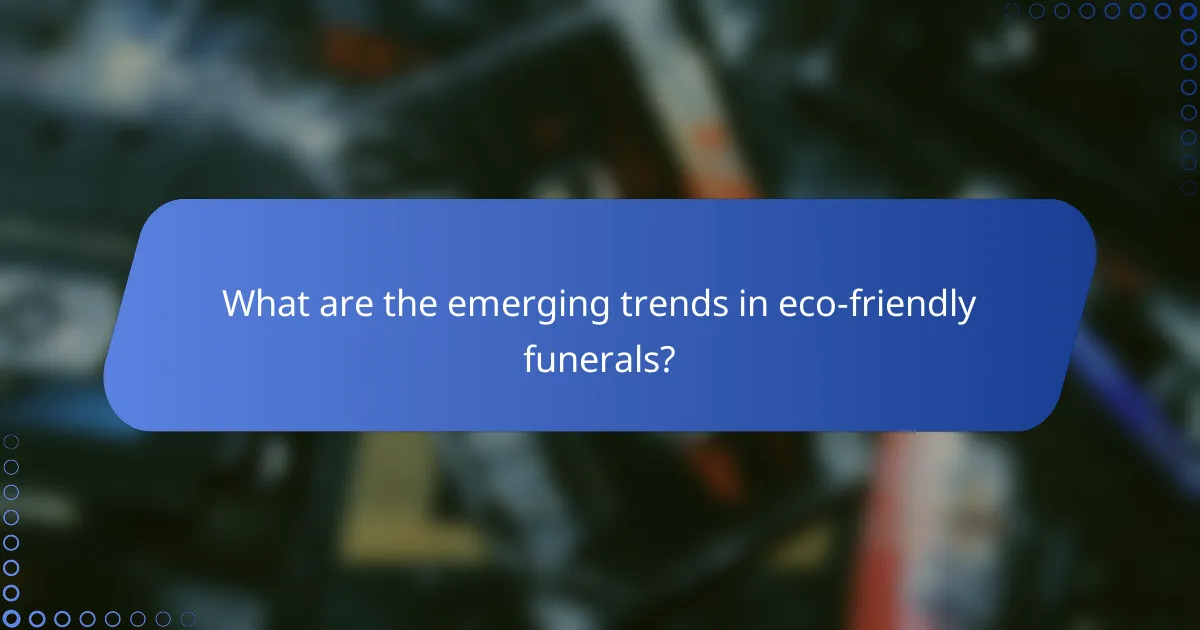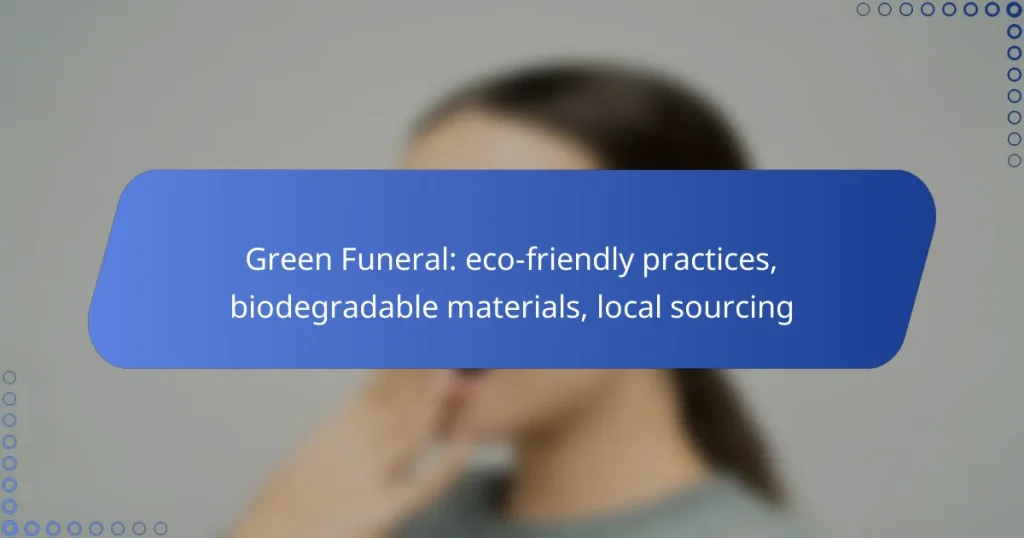Green funerals prioritize eco-friendly practices that minimize environmental impact while honoring the deceased. These sustainable methods include the use of biodegradable materials, such as natural caskets and urns, and promote local sourcing to strengthen community ties. By embracing these practices, families can create meaningful memorials that respect nature and support sustainability.

What are eco-friendly funeral practices in Canada?
Eco-friendly funeral practices in Canada focus on minimizing environmental impact through sustainable methods. These practices often include natural burials, green cremation, and memorial tree planting, all designed to respect nature while honoring the deceased.
Natural burial options
Natural burial options involve interring the body in a biodegradable casket or shroud without the use of toxic embalming fluids. This method allows the body to decompose naturally and return to the earth, promoting soil health.
In Canada, many cemeteries now offer designated green burial sections that adhere to environmental standards. Families should consider local regulations and the availability of such sites when planning a natural burial.
Green cremation methods
Green cremation methods, such as alkaline hydrolysis, use water and potassium hydroxide to break down the body, significantly reducing carbon emissions compared to traditional cremation. This process is often referred to as “water cremation” or “aquamation.”
In Canada, the acceptance of green cremation is growing, with some provinces already allowing this method. Families should check local laws and the availability of facilities that offer these eco-friendly cremation options.
Memorial tree planting
Memorial tree planting involves planting a tree in memory of the deceased, serving as a living tribute that contributes to the environment. This practice not only honors the individual but also helps combat climate change by increasing green spaces.
Many organizations in Canada facilitate memorial tree planting, often providing families with a certificate and details about the tree’s location. This option can be a meaningful addition to any eco-friendly funeral plan.

How can biodegradable materials be used in funerals?
Biodegradable materials can be integrated into funerals to minimize environmental impact by using products that decompose naturally. This approach includes options like biodegradable caskets, eco-friendly urns, and compostable burial shrouds, all designed to reduce waste and promote sustainability.
Biodegradable caskets
Biodegradable caskets are made from natural materials such as bamboo, willow, or recycled paper. These caskets break down over time, returning to the earth and avoiding the use of harmful chemicals found in traditional wood or metal options.
When choosing a biodegradable casket, consider local regulations regarding burial practices, as some areas may have specific requirements. Additionally, prices can vary widely, typically ranging from a few hundred to a couple of thousand dollars, depending on the material and craftsmanship.
Eco-friendly urns
Eco-friendly urns are designed to hold ashes while being made from biodegradable materials like cornstarch, salt, or recycled paper. These urns can be buried or even used in water ceremonies, where they dissolve and return to nature.
When selecting an eco-friendly urn, look for products that meet environmental standards and are free from toxic materials. Prices for these urns can range from around $50 to several hundred dollars, depending on design and material.
Compostable burial shrouds
Compostable burial shrouds are fabric coverings made from organic materials such as cotton or hemp. These shrouds allow for a natural burial process, breaking down along with the body and enriching the soil.
When considering compostable shrouds, ensure they are free from synthetic fibers and dyes to maximize biodegradability. Costs typically range from $100 to $300, depending on the fabric and design chosen.

What are the benefits of local sourcing for green funerals?
Local sourcing for green funerals offers several advantages, including a reduced environmental impact and stronger community ties. By choosing local products and services, families can support sustainable practices while honoring their loved ones.
Reduced carbon footprint
Local sourcing significantly lowers the carbon footprint associated with funerals. When products are sourced nearby, transportation emissions are minimized, which is a key factor in reducing overall environmental impact. For example, using locally grown flowers instead of imported ones can cut down on fuel consumption and packaging waste.
Additionally, many local funeral homes may use eco-friendly practices, such as energy-efficient facilities and biodegradable materials, further contributing to a smaller carbon footprint. Families can inquire about these practices when selecting services.
Support for local businesses
Choosing local suppliers for funeral services and products directly supports the local economy. This can include florists, casket makers, and caterers who prioritize sustainable practices. By investing in these businesses, families help maintain jobs and foster economic resilience in their community.
Moreover, local businesses often have a vested interest in maintaining strong community relationships, which can lead to more personalized service and a greater understanding of cultural or regional funeral customs.
Community engagement
Local sourcing fosters community engagement by encouraging families to connect with their neighborhoods during a difficult time. This can include collaborating with local artisans for memorial items or participating in community events that honor the deceased. Such involvement can provide emotional support and strengthen community bonds.
Additionally, many local funeral homes offer workshops or support groups that help families navigate the grieving process, creating a sense of belonging and shared experience. Engaging with the community can be a healing aspect of the funeral process, making it more meaningful for those involved.

What criteria should you consider when choosing a green funeral service?
When selecting a green funeral service, consider their commitment to eco-friendly practices, use of biodegradable materials, and local sourcing. These criteria ensure that the service aligns with sustainable values and minimizes environmental impact.
Certification and standards
Look for funeral services that are certified by recognized organizations focused on sustainability, such as the Green Burial Council. These certifications indicate adherence to specific environmental standards, ensuring that the service meets eco-friendly criteria.
Additionally, check if the service complies with local regulations regarding green burials, which may vary by region. Understanding these standards helps ensure that your choice supports genuine eco-friendly practices.
Service offerings
Evaluate the range of services provided, including options for biodegradable caskets, natural burial sites, and eco-friendly cremation methods. A comprehensive green funeral service should offer alternatives that minimize environmental impact while honoring the deceased.
Consider whether they provide personalized services, such as memorials that incorporate native plants or locally sourced materials. This not only supports local economies but also enhances the sustainability of the funeral process.
Pricing transparency
Ensure that the funeral service provides clear and upfront pricing for all green options. Transparent pricing helps you understand the costs associated with eco-friendly choices and prevents unexpected expenses.
Ask for a detailed breakdown of services and materials, including any additional fees for green options. This clarity allows for informed decision-making and helps you stay within your budget while honoring sustainable practices.

What are the emerging trends in eco-friendly funerals?
Emerging trends in eco-friendly funerals focus on sustainable practices that minimize environmental impact. These practices include the use of biodegradable materials, local sourcing of funeral products, and increased transparency in the funeral industry.
Rise of biodegradable options
The rise of biodegradable options in funerals reflects a growing preference for environmentally friendly practices. Biodegradable caskets and urns, made from materials like bamboo, wicker, or recycled paper, decompose naturally and reduce waste.
Families can choose these options to ensure that their loved ones’ remains return to the earth without leaving a lasting footprint. Prices for biodegradable caskets typically range from a few hundred to a couple of thousand USD, depending on the material and craftsmanship.
Increased demand for transparency
There is an increased demand for transparency in the funeral industry, as consumers seek clarity about pricing and practices. Families are more informed and want to understand the environmental impact of their choices, prompting funeral homes to disclose details about the sourcing and materials used.
Funeral providers are responding by offering clear pricing structures and information on the sustainability of their products. This shift not only builds trust but also encourages more eco-conscious decisions among families planning funerals.

